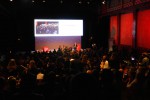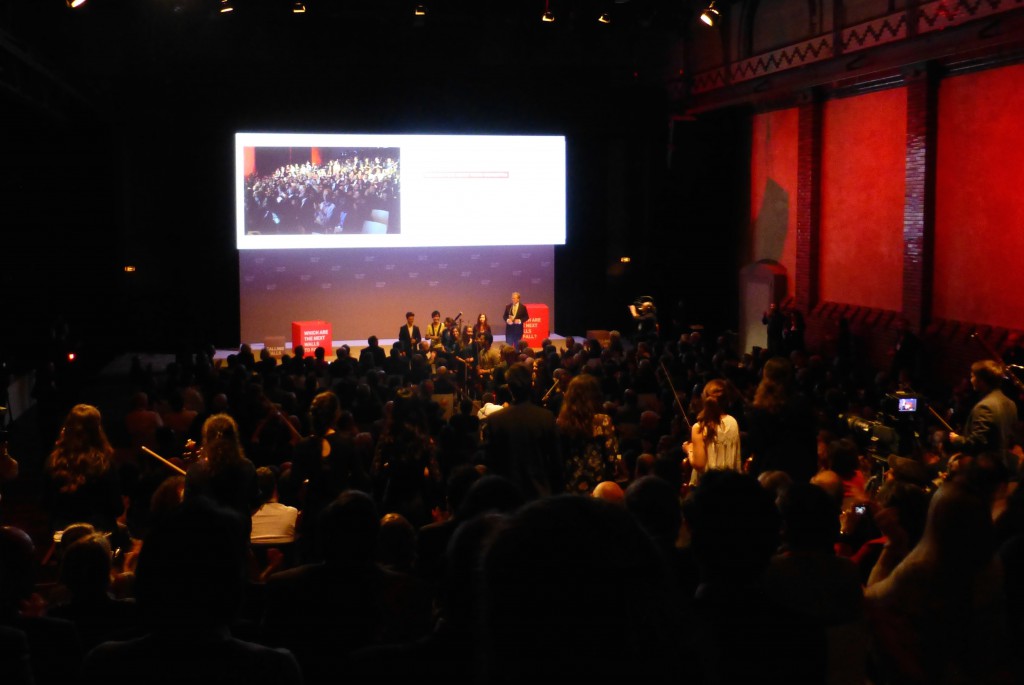#FallingWalls15: Visions for Wisdom and Our Planet’s Future

 Only a few days to go until the Falling Walls Conference will celebrate its 7th edition, bringing together leading researchers, innovators as well as 100 of the most promising young scientists from around the world. Here’s a little sneak peek into this interesting event in Berlin you can attend via live stream on Sunday, Nov 8 and on Monday, Nov 9. Read this article in German here.
Only a few days to go until the Falling Walls Conference will celebrate its 7th edition, bringing together leading researchers, innovators as well as 100 of the most promising young scientists from around the world. Here’s a little sneak peek into this interesting event in Berlin you can attend via live stream on Sunday, Nov 8 and on Monday, Nov 9. Read this article in German here.
 The European Union Youth Orchestra breaking the walls between audience and musicians at the Falling Walls Conference 2014.
The European Union Youth Orchestra breaking the walls between audience and musicians at the Falling Walls Conference 2014.
What is the most important substance in our life – and how can we preserve it? Top researchers from around the world will discuss this and other vital questions during this future-oriented annual meeting on the occasion of one of the most historic events in modern history, the fall of the Berlin Wall on November 9, 1989.
This year’s topics include water management, climate change and international crisis management – some of the most fundamental questions about the future of humanity on our planet.
So – what is the most important substance in your life? Have you ever thought about it? To be honest – who can live from love and air alone?
Water is Life!
Nobody can survive without water. All life is based on this precious substance. About 70 % of the human body consists of water. Nothing on earth is possible without H2O, this chemical compound of one oxygen and two hydrogen molecules – no life, no production, no economy.
Living in Germany means being privileged. Germany has enough water resources, but what about all those countries with water scarcity? Imagine life without clean, fresh (tap) water. That’s the future for many people on this planet until we become aware and rethink how we use each drop.
Professor Arjen Hoekstra from the University of Twente in the Netherlands is one of the leading experts in the field of water management. He explores the relationship between water management, consumption and trade. Therefore he developed a standard for measuring water consumption per end product, the “water footprint”.
How much water is consumed and polluted throughout the manufacture of a cotton shirt, for example? Did you know that it takes about 2700 liters of water to make just one single T-shirt? This would be enough for one person to drink water for at least 900 days!
Dr. Dyllon Garth Randall from South-Africa won last year’s third place at the Falling Walls Lab for his innovative idea on “Breaking the Wall of Wastewater using Eutectic Freeze Crystallization – a water treatment process that recovers both water and other useful products thus being financially and environmentally sustainable.
Events such as Falling Walls with people like Arjen Hoekstra and Dyllon Garth Randall help us to be(come) more aware of our (water) consumption. Maybe small, but important steps towards sustainability. This also makes this event so special and important. Thanks to everyone taking part.
Music -The Universal Language
Last but not least I would like to share with you one of my last year’s favorites: The European Union Youth Orchestra (EUYO) concluding the Falling Walls Conference 2014. Music as a “universal language” – feel free to join and clap your hands, too!
Further information & program:
- For all speakers and for the complete program, please visit: http://falling-walls.com/conference/speakers/2015.
- Everyone is invited to follow the event via Twitter (#FallingWalls15), the blog www.fallingwallsfragments.com and / or via web streaming, starting on Sunday, November 8 at 9.30 am CET for the Falling Walls Lab and on Monday, November 9 (9 am – 7 pm CET) for the Falling Walls Conference.
- People interested in science-based start-ups can follow the live stream of the Falling Walls Venture on Sunday, November 8 (11 am – 6 pm CET).
- http://falling-walls.com/livestream


Pingback:#FallingWalls15: Visionen für Weisheit und Zukunft auf unserer Erde › Medicine & More › SciLogs - Wissenschaftsblogs
Pingback:What Makes Us #HUMAN ? › Medicine & More › SciLogs - Wissenschaftsblogs